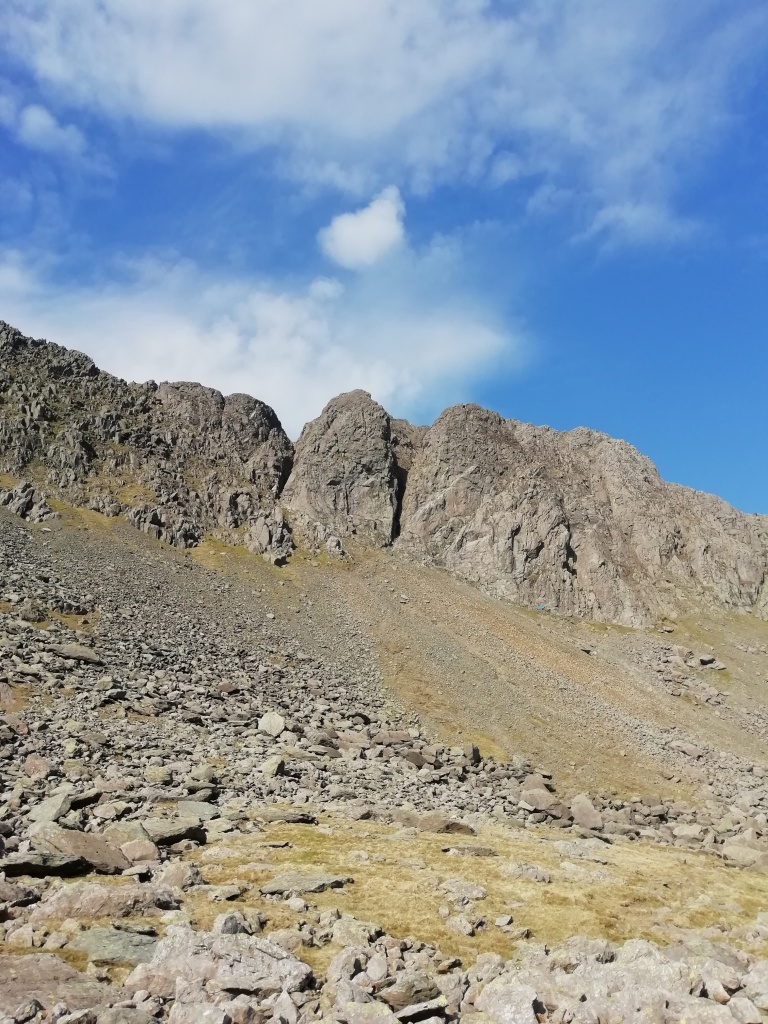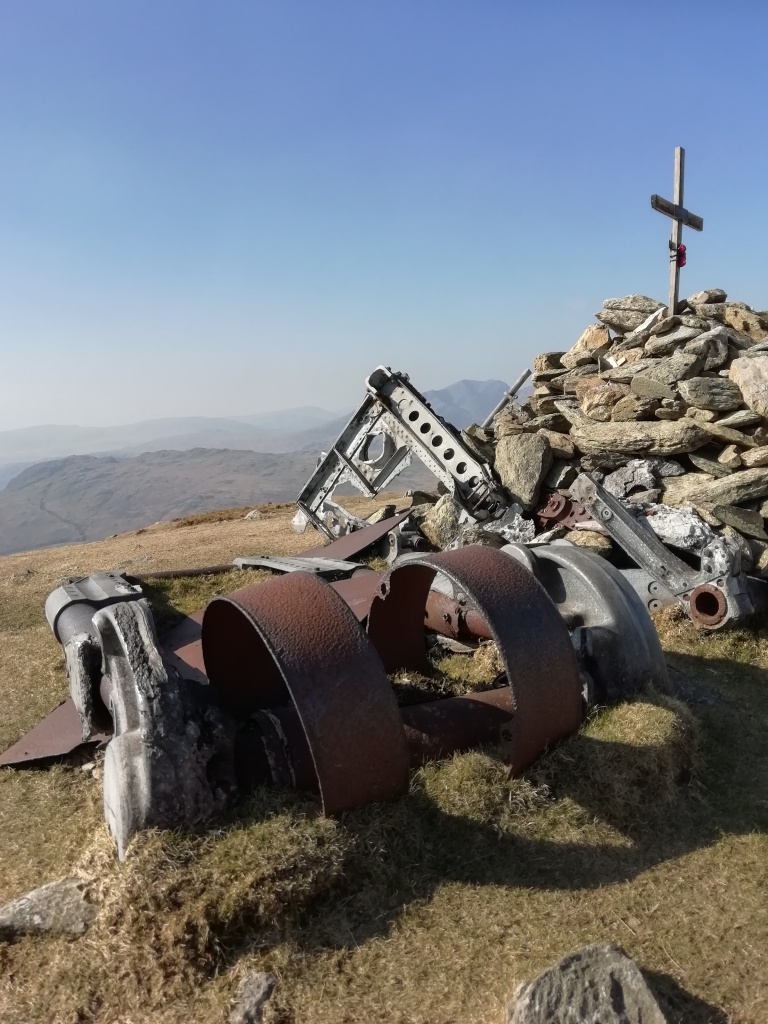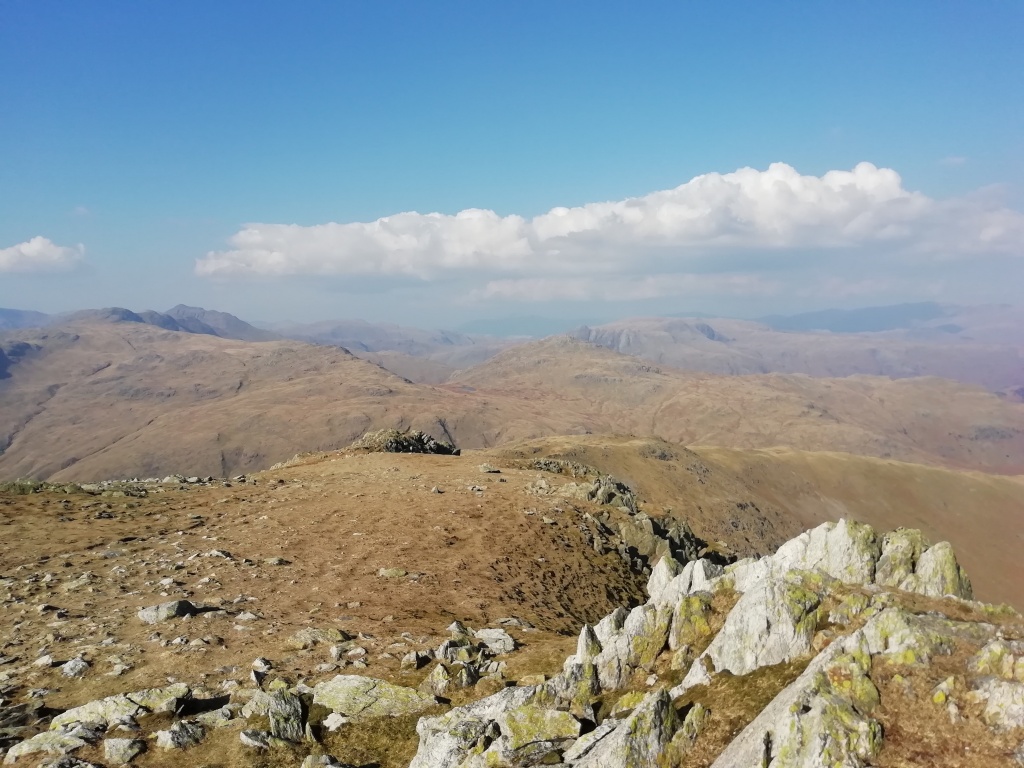On Mothering Sunday, 2022, I walked up the Walna Scar Road from Coniston towards Goat’s Water, easing out stiffness from the two days I’d already spent on the fells. I’d told everyone it would be a good trip even if it rained, fun to travel solo and potter about, you know, but in fact it was bright and clear all weekend and I was out each day almost as long as it was light. On Mothering Sunday, I thought I would do the South Rake again, just because I could. The scree slopes rise from Goat’s Water, and Dow Crag rises above the scree slopes, and the South Rake is a deep gully tucked behind outcrops of rock on the left as you look up. The sun was hot but the gully was cool. I had climbed it once by myself, two days earlier; once with friends, who carried books with them, just in case, or swore all the way; and once in cloud, a long time ago, with my dad, and my mum.
My mum loved scrambling on rock. Given the choice between climbing over a pile of rocks and going round by the path, she would always go over the rocks, and I would always follow. For less spontaneous scrambling, though—for a named route, like the easiest scrambling route up Dow Crag—she would only tackle it if she was quite sure we would manage it without having to call out Mountain Rescue. It wasn’t that she was afraid of injury. She might have been a paramedic in another universe—someone who was unsqueamish and even quite interested in patching people up after their scrapes and sprains. You just couldn’t risk calling out Mountain Rescue because it would be so embarrassing: such a waste of their time and resources, such an indictment of yourself, because you were supposed to be responsible in the hills, competent as a parent, considerate as a citizen. My mum felt guilty about the times we lost our way or took a risk with my little brothers unwillingly in tow. She felt guilty at times when we were successful and found our way easily, because hiking was a luxury activity and did nothing to help the rest of the world. Still, she wanted to be in the mountains, getting the map out to match up half-recognised shapes on the skyline. That must be Bow Fell, that must be Great Gable, that must be Pillar.
I must have been fourteen or fifteen when my mum and I left my dad and my brothers hanging out together in Ballachulish to climb the mountain we could see out the back, a grand triangle of rock and heather. I think we did this twice, because I remember climbing through a cloud inversion, thinking it was a grey dull day and then finding that the cloud was a single layer of cotton wool over the loch, and we were ascending in brilliant sunshine. And I remember my mum and I being on the top of Sgorr Dhearg in cloud and wind so strong we were clinging to the ground, and the clouds were rushing past us, and it felt as if the mountain itself was rushing forwards, carrying us with it, unstoppably.
There’s something about mountains; my mum’s voice saying lean into the mountain as we inched down a path that either was too steep or seemed too steep. In the South Rake on Dow Crag, that first time, climbing through cloud, at a time when I was more unequivocally evangelical than I am now, I had a sort of small epiphany about what it means to say on Christ the solid rock I stand. Before that, I’d always imagined the rock beneath and the human standing on it (being understood by the rock, like somebody’s staff in The Two Gentlemen of Verona). In a gully full of scree, you have to stand on the solid rock, the firm ledge on one side rather than the slipping stones in the middle, and the rock is all around you; there is a whole entire mountain’s worth of solid rock around you and you are standing on one tiny part of it, within it. Rock of ages, cleft for me, help me hide myself in thee, and so on. It’s a nice idea, even if I don’t know quite how to do it, exactly.
In the South Rake you naturally keep on pressing up, whether or not you are my friend who spent the whole climb saying fucking hell fucking hell fucking hell. On Mothering Sunday, 2022, from the exit from the South Rake I walked up and over Dow Crag, across the flank of Coniston Old Man, over Swirl How, up Wetherlam, down the other side and back across the rambling moorland that I think must have been High Topps in Arthur Ransome’s Pigeon Post. Perhaps somehow you are supposed to hide in the cleft rock while you also keep on climbing, chatting to the friendly walking club who spotted your orange t-shirt from the other side of Goat’s Water, pausing for tea from a thermos, cataloguing the strange things you overhear blokeish-looking blokes talking about on mountains, like speciality watches, or the financial year. You name the other mountains you can see, Scafell, Skiddaw, Blencathra, Helvellyn. On the side of Swirl How you find a memorial cairn, a cross, the remains of a Halifax bomber.
It was tempting, that year, to feel guilty for running away from church. Possibly, I thought, if I had been braver and less selfish, I would have stayed in Cambridge and gone to church. But as it turned out I was selfish and not brave and I thought well, we could just all skive off church if we wanted, no doubt God would understand (and under-stand, the solid rock). So since then I have been selfish and not brave every year. It is a pity, when the vicars up and down the land want so badly to include everyone in church, whatever their joy or sadness might be. It might be a character flaw to like being alone in the hills. It might be ungrateful to want to be away from people. Or maybe it’s a sign of a decent church when it is ok to not be there. Anyway, even a good church can’t fix everything, and has to put up with being good in its own way, as its own thing, not a substitute for the absences we feel.
I would have liked, in another universe, to be included in a triad of hillwalkers: my mum, me, and the daughter I don’t have, climbing Dow Crag together. I can slip into that fantasy easily, even though I know that my non-existent daughter might have taken after her uncles when it came to disliking walking, and my mum might have spent the whole time worrying that we should have stopped to talk to that person who looked sad in the car park.
I’m not sure I can imagine, exactly, what she would have said or thought about the lump of sadness of the last few Mother’s Days. I can imagine the tight hug of her empathy, but also her bone-deep resistance to any kind of slough of despond, or hamster-wheel of fretting, or dragging tiredness I might get stuck in. She got stuck herself, often, but she preferred to be doing something, to be active and connected with hands and heart and mind to people she could care for. Every time a student or international friend went back to Japan or Italy or Russia or South Korea, my mum was so sad to see them go, even though this happens often with language teaching and international ministry. My mum’s students often became The Lovely [Student’s Name] when she came home from teaching and talked about her day. When I trained in language teaching myself, in the same college, my tutor said it was odd observing my practice lessons, because if she looked up she saw me, but if she looked down at her notes she heard Anne.
I don’t know if there’s an alternative universe in which my mum climbed mountains without feeling guilty about it. One where she got to spend longer doing the work in which she was so brilliant and did so much good. But I’m grateful that I got to follow her up and over so many craggy and slanting rocks, keeping balance, testing handholds, finding our way. That we got to so many mountain tops, one way or another, under cloud cover and in sunlight. That amid the things that might have happened or didn’t happen or can’t happen or couldn’t have happened, I can think of real granite and moss under fingers and palms, heather stalks, slate, cold tarns, summit cairns.



This is brilliant 💕
I can think of no better place to be on a deeply sad day than in The Lakes District. I’ve found that grief asks for the freedom to do what needs to be done, when it needs to be done. In that, there seems to be healing. When the mountains call, even church responds “I’m on my way”.
May the many memories be accompanied by many smiles, at least sometimes, as the tears also roll.
Thank you, Lucy – I have just re-read, more carefully this time, and that’s a lovely piece of writing and of remembering your mum